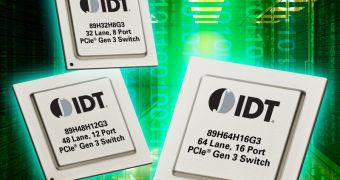Solid state drives may not be overly popular on the enterprise front, but inventions like IDT's newest PCI Express switch definitely help with their reputation, what with the higher speed and larger capacity potential and everything else.
IDT issued a press release, not long ago, in which it announces its newest and best family of Gen 3 PCI Express switches.
Aimed at cloud computing applications and other storage arrays made out of solid state drives, they can allow up to 64 lanes and 16 ports.
In other words, up to 128 GB/s can be switched every second, essentially making it the mightiest single-chip Gen 3 PCI Express solution there is.
“IDT continues to be a strong contributor to the PCIe ecosystem,” said Jim Pappas, Director of Technology Initiatives, Intel Corporation (NASDAQ: INTC).
“As the demand for enterprise storage and computing hardware grows, PCI Express will continue to be a critical system interconnect protocol. Intel is encouraged to see IDT's growing portfolio of PCIe Gen 3 switches and retimers.”
The family is composed of IDT 89H64H16G3, 89H48H12G3 and 89H32H8G3, with 64/16, 48/12 and 32/8 port/lane counts, respectively.
All of them have clock isolations, multicast and a multi-root partitioning feature (designers can reduce costs by replacing multiple PCIe switches with a single monolithic one).
Samples are already being sent out in 35 x 35mm, 27 x 27mm and 23 x 23mm BGA packages.
“The future of Cloud Computing and PCIe SSDs rely on the advancements of PCI Express technology. As the leader in PCIe solutions, our customers rely on IDT to deliver the cutting-edge ICs needed to support their next generation designs,” said Kam Eshghi, Sr. Director of Marketing for the Enterprise Computing Division at IDT.
“Our latest PCIe Gen 3 switches build upon our industry-leading portfolio of PCIe solutions and complement the industry’s first PCIe Gen 3 signal conditioning re-timers that IDT announced last November.”

 14 DAY TRIAL //
14 DAY TRIAL //